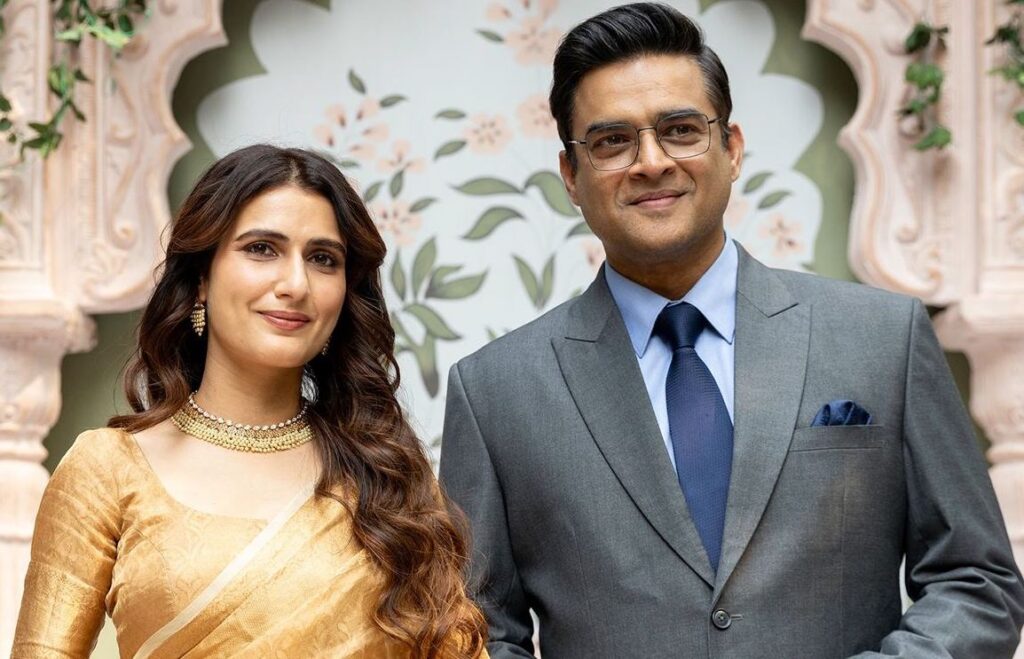Vivek Soni’s romantic comedy Aap Jaisa Koi, now streaming on Netflix, aims to question the patriarchal ideas that continue to shape modern relationships and the delicate struggle for equality between men and women. On paper, it’s a compelling and timely premise. But as the film unfolds, it ends up feeling more like cosmetic storytelling rather than anything deeply felt or genuinely transformative.
Shrirenu Tripathi (R Madhavan), a 42-year-old Sanskrit professor, has spent most of his life trying, and failing, to find love. Hampered by his conservative upbringing and a crippling lack of confidence around women, he remains single, never having known the comfort of a romantic partner. His well-meaning sister-in-law, Kusum (Ayesha Raza), keeps trying to arrange his marriage, but with little success. In a bid to shake things up, Shrirenu’s photographer friend, Deepak (Namit Das), introduces him to a sex-chat app called Aap Jaisa Koi. Hoping for a fleeting thrill, Shrirenu signs up. Meanwhile, Kusum finally finds what seems like a perfect match – Madhu Bose (Fatima Sana Shaikh), a French teacher with a modern, open-minded view of relationships. Shrirenu and Madhu quickly form a bond and decide to marry. But on the day of their engagement, a shocking secret comes to light that shatters their relationship…
Aap Jaisa Koi underscores that in any relationship, mutual respect is essential. Neither partner should wound the other’s dignity or pass judgment that chips away at self-worth. Yet, as the film astutely suggests, most men raised in a deeply patriarchal society are cut from the same coarse fabric, conditioned over decades to accept these ingrained biases. It’s hardly surprising, then, that shedding such attitudes proves so difficult. This is the uneasy terrain the film explores, and constructs a world where women have the agency to make choices without requiring a man to set the terms of their freedom. The narrative also makes a subtle point through profession. Shrirenu, a Sanskrit professor, is so steeped in cultural tradition that he fails to see how it’s rendered him rigid and conservative. While Madhu, by contrast, as a French teacher, embodies a certain cosmopolitan openness, outspoken, liberal, and unafraid to claim her desires.
Soni maintains a commendable enough grip on the material, steering clear of cheap sentimentality. But the film’s weak writing (Radhika Anand, Jehan Handa) and breathless pace ultimately undermine its emotional depth. Shrirenu’s growing attachment to Madhu unfolds so hastily that when conflict inevitably erupts, we’re scarcely prepared to invest in the heartbreak of these would-be lovers. It feels less like an organic unravelling than a neatly engineered midpoint twist designed to propel the plot. Later, as Shrirenu clumsily seeks redemption, the narrative advances with similar impatience. His decision to enlist a cheeky student, who earlier mocked him in class, to unearth details about Madhu’s past verges on frivolity. It’s only in the final thirty minutes that the film finds a steadier footing and tries to deliver the emotional depth it had mostly avoided until then.
Another area the film falters in is its cultural observations. The clash between the Tripathis of Jamshedpur and the Boses of Kolkata is handled with clumsiness. Bengalis are lazily reduced to fish-eating stereotypes, and of course, no Bengali family is complete without a pujo. Moreover, the Bose family is inundated with so many members that it makes us wonder whether their sheer number is meant to distract from the lack of deeper character development. Little in Aap Jaisa Koi lends complexity to its relationships or confrontations, which robs the film of the nuance it so clearly needed. It’s hard not to recall Rocky Aur Rani Kii Prem Kahaani (2023), where the screenplay approached similar cultural contrasts with a certain flamboyant maturity, rather than the tactless mimicry on display here.
In terms of performances, R Madhavan lends Shrirenu Tripathi a gentle awkwardness that suits the character’s diffidence, while Fatima Sana Shaikh brings a spirited, outspoken energy to Madhu Bose. Ayesha Raza infuses Kusum with welcome shades of nuance, and Manish Chaudhary as her husband, Bhanu Tripathi, embodies the firm authority of a conservative husband. The rest of the cast are serviceable, largely orbiting around these central performances without leaving much of a distinct mark.
Debojeet Ray’s cinematography beautifully captures the characters in their various emotional states. Prashanth Ramachandran’s editing lends the narrative a certain fluidity even if there’s only so much he can salvage from a screenplay that resists deeper engagement. Dhiman Karmakar’s sound design and Justin Prabhakaran’s background score work in effective tandem, subtly shaping the film’s moods. Rochak Kohli’s songs are pleasant, gentle, and worthy of a relaxed listen.
Aap Jaisa Koi is decent enough viewing in its best moments. But with greater depth and keener characterisation, it might have evolved into something far more substantial. As it stands, the film seems content to glide along the surface, never quite probing the complexities it so readily gestures toward.
Hindi, Romantic Comedy, Drama, Color


